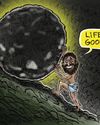
“Wovon man nicht sprechen kann, darüber muss man schweigen.”
(‘Whereof one cannot speak, thereof one must be silent.’)
Ludwig Wittgenstein, Tractatus Logico-Philosophicus, 1921
In this final proposition of his Tractatus, Ludwig Wittgenstein prohibits the impossible. But why should one prohibit something that is already in itself impossible? The answer is relatively easy: if we ignore this prohibition, we produce statements which are for Wittgenstein meaningless, just as speculations about the noumenal domain are in Immanuel Kant’s philosophy. (The psychoanalyst Jacques Lacan qualified the prohibition of incest in a similar way, claiming that its result is to render the impossible possible: if incest has to be prohibited, it means that it is possible to violate the prohibition.) There is, however, an ambiguity in Wittgenstein’s proposition, which resides in the double meaning of the German nicht ... kann. It can mean either simple literal impossibility, or a deontic (moral) prohibition: ‘You cannot talk/behave like that!’ The proposition can thus be read in the radical ontological sense intended by Wittgenstein himself – that there are things impossible to talk about, such as metaphysical speculations – or else in a conformist moral sense: ‘Shut up about things you are not allowed to talk about!’
Diese Geschichte stammt aus der December 2023 / January 2024-Ausgabe von Philosophy Now.
Starten Sie Ihre 7-tägige kostenlose Testversion von Magzter GOLD, um auf Tausende kuratierte Premium-Storys sowie über 8.000 Zeitschriften und Zeitungen zuzugreifen.
Bereits Abonnent ? Anmelden
Diese Geschichte stammt aus der December 2023 / January 2024-Ausgabe von Philosophy Now.
Starten Sie Ihre 7-tägige kostenlose Testversion von Magzter GOLD, um auf Tausende kuratierte Premium-Storys sowie über 8.000 Zeitschriften und Zeitungen zuzugreifen.
Bereits Abonnent? Anmelden

The Two Dennises
Hannah Mortimer observes a close encounter of the same kind.

Heraclitus (c.500 BC)
Harry Keith lets flow a stream of ideas about permanence and change.

Does the Cosmos Have a Purpose?
Raymond Tallis argues intently against universal intention.

Is Driving Fossil-Fuelled Cars Immoral?
Rufus Duits asks when we can justify driving our carbon contributors.

Abelard & Carneades Yes & No
Frank Breslin says 'yes and no' to presenting both sides of an argument.

Frankl & Sartre in Search of Meaning
Georgia Arkell compares logotherapy and atheistic existentialism.

Luce Irigaray
Luce Irigaray, now ninety-two years old, was, among many other things, one of the most impactful feminists of the 1970s liberation movements - before she was marginalised, then ostracised, from the francophone intellectual sphere.

Significance
Ruben David Azevedo tells us why, in a limitless universe, we’re not insignificant.

The Present Is Not All There Is To Happiness
Rob Glacier says don’t just live in the now.

Philosophers Exploring The Good Life
Jim Mepham quests with philosophers to discover what makes a life good.